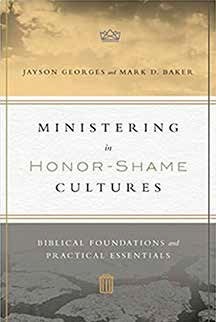MInistering in Honor-Shame Cultures: Biblical Foundations and Practical Essentials
Book Review by Scott Hedley

This book was eye-opening to me, a Westerner, in that it helped me to better understand my ministry colleagues in Asia. Understanding the concepts in this book is also important to the global church because most of the ethnic groups with limited or no access to the gospel (i.e. Unreached People Groups) are predominantly honor-shame in their cultural outlook. It is important for Westerners to understand why hospitality, indirect communication, purity regulations and patronage are all common features of honor-shame cultures. Western Christians must also realize that their own cultural values (i.e. independence, direct speech, efficiency, scientific rationalism, convenience and egalitarianism) are equally hard to understand in the eyes of non-Westerners.
To neglect honor-shame concepts in our explanation of the gospel could lead people into a shallow relationship with God, as people trust God for one component of salvation (i.e. forgiveness of sin’s guilt), but then bypass Christ’s work for absolving sin’s shame.
The authors offer an interesting new perspective on the story of the prodigal son. The authors believe that Jesus was telling this story in order to question the flawed identities of both groups – the falsely shamed and the falsely honored. The parable is an invitation to the audience to abandon their old identity as either a despicable rule breaker or respectable rule keeper, and embrace the new status that the Father offers. Just as the father (in the prodigal son story) willingly suffered shame to communicate love and forgiveness in order to restore relationship with each son personally and together as a family, Jesus also summons the Pharisees to adopt His radical, shame-bearing love and join His mission of honoring the shamed through table fellowship.
For those of us ministering in other cultures, it is important for us to analyze the host culture. Here are some important questions for mining the honor-shame elements in a culture. What common terms, idioms, or euphemisms refer to the concepts of honor and shame in your host culture? What are the primary symbols and images of honor and shame? When someone is disgraced, how do they try to restore their honor? What cultural rituals and practices confer status (high or low)? What words communicate respect and disrespect? What objects are associated with honor and shame? What commonly known stories or characters embody the cultural notions of honor-shame? The answers to these questions become the metaphoric language for explaining biblical salvation. After doing this research, the field workers then can select biblical stories and images in the Bible that parallel cultural notions of honor and shame in the host culture.
The authors provide a great list of biblical stories that address concepts of honor and shame in chapter 8 (evangelism) and in the appendices. I recommend this book for all people who work in non-Western cultures.









comments